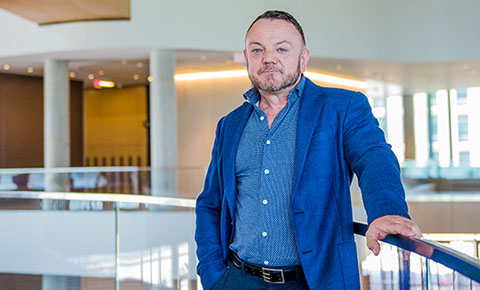Spillane Honored for Mentoring Young Scholars

Northwestern University professor James Spillane received the 2022 Spencer Foundation Mentor Award for his generous, wise, and decades-long support of the next generation of scholars.
Given annually, the award recognizes researchers like Spillane, who have shaped the field both through their own influential work and by guiding others through the maze of academic life.
Spillane, the Spencer T. and Ann W. Olin Professor in Learning and Organizational Change at the School of Education and Social Policy and faculty fellow at the Institute for Policy Research, was nominated by Dean David Figlio, former students, advisees, and colleagues. Rebecca Lowenhaupt, a former postdoctoral fellow, organized the effort.
“As a scholar, Jim is nimble and innovative as he interprets the world around him,” said Lowenhaupt, associate professor of educational leadership at Boston College's Lynch School of Education and Human Development. “Conversations with him about ideas, data, and research have been one of the most exciting, joyful, and profound learning experiences I’ve ever had. His enthusiasm for intellectual exploration is both infectious and electrifying.”
A first-generation high school and college student from rural Ireland, Spillane has been elected to the American Academy of Arts and Sciences and the National Academy of Education and is one of the world’s top thinkers on school leadership issues, change within organizations, and policy implementation at the state, school, and classroom levels.
He is known for his ability to bridge disciplines–he is also professor of human development and social policy and professor of learning sciences– and for mentoring across difference, said Simone Ispa-Landa, associate professor of human development and social policy at SESP.
“He is always seeking out opportunities for his junior scholars, and he mentors in a way that is selfless and is truly focused on helping the mentee,” she said.
Lowenhaupt first met Spillane while working with him on his distributed leadership study. No matter what they were discussing in his office, she said, he could pull out a relevant research paper from a nearby filing cabinet.
His vast storehouse of knowledge “provided the perfect framework for whatever conversation we were having,” Lowenhaupt said. “He modeled how our work builds off the work of others and expands on existing theories. He was always making connections between ideas and across disciplines.”
As a mentor, Spillane continued the bridge building for his mentees, offering his perspectives on the best ways to navigate complex collaborations. It was life-changing for Corey Drake (PhD01), who started her doctoral work in 1996, Spillane’s first year at Northwestern.
Drake, a former middle school special education teacher, took Spillane’s class and became his advisee, two events that she said changed the trajectory of her career.
Now head of school at Open Wings Learning Community in Kenosha, Wisc., Drake still draws on Spillane’s work looking at the relationships between policy and practice, individuals and systems, and teachers and leaders.
But perhaps even more important, her career has been influenced by “the broader lessons he taught me - about holding yourself to high expectations, about learning with and from colleagues, and about using research to tell important stories,” Drake said. “He has re-shaped both the field of education and the work of teachers and leaders in schools and school systems.”
Lowenhaupt coauthored the book Navigating the Principalship: Key Insights for New and Aspiring School Leadership with Spillane. And as she built her career over the past decade, she often reached out for advice. Sometimes she just needed a supportive email. Other times, “he found time to puzzle through more substantive questions about my research, writing, or help me figure out how to respond to an ethical dilemma,” she said.
Throughout it all, he consistently asked about her family, hobbies, or the books she was reading. “Jim always made a point of asking about other parts of my life, recognizing that our work takes place in the context of our full lives,” she said. “His generosity and care have enhanced the lives of so many of us.”